Probiotics and Your Health
 Did you know about 70 percent of your immune system resides in your gut?
Did you know about 70 percent of your immune system resides in your gut?
Probiotics are beneficial bacteria that live in our digestive tract and help digest food, synthesize vitamins and support our immune systems. Taken in childhood, probiotics appear to help young children avoid immune-mediated diseases such as asthma, eczema, colds, and type 1 diabetes.
While your body consists of about ten trillion cells, the bacteria that live within us add up to close to a hundred trillion cells. The vast majority of these bacteria live in the digestive tract. A healthy intestinal tract contains some 2 – 3 lb. of good bacteria. You have more bacteria in your intestinal tract body than you do in your cells … you’re outnumbered!
The body’s defenses are centered in the digestive tract where immune cells and probiotics or good bacteria team up to resist infection.
Whenever we are exposed to harmful bacteria, yeast, or parasites, our immune cells in the digestive tract can shield us from harmful contamination. Probiotics aid this process by boosting the effectiveness and activity of these intestinal immune cells.
It’s also simple and inexpensive to make probiotic foods at home.
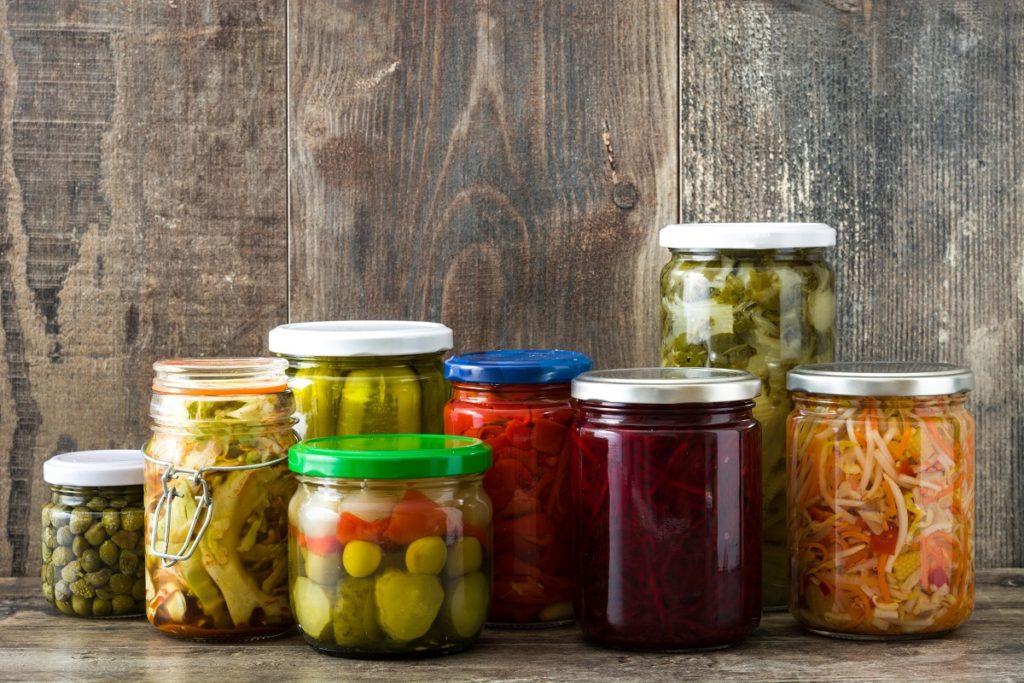 Sources of probiotics include:
Sources of probiotics include:
- Fermented vegetables: sauerkraut, kimchi, pickles, beets, carrots
- Fermented fruits: chutneys, jams, green papaya, pickled jackfruit
- Yogurt, kefir, sour cream, buttermilk with live and active cultures (pick plain and no added sugar)
- Kombucha, a fermented beverage
- Fermented condiments: homemade ketchup, relishes, salsas and pickled ginger
- Water kefir, coconut milk kefir
- Homemade coconut milk or cashew yogurt
- Beet kvass, a fermented beet juice
- Natto, miso, tempeh and tamari sauce
Research on Probiotics
Research on probiotics show that they have multiple functions which help immune cells protect against infection. A study in France found that strains of Bifidobacterium helped decrease harmful bacteria, kept them from invading healthy cells and killed off some types of Salmonella, a bacteria that frequently causes food poisoning.
In another study, when scientists gave a group of people a probiotic supplement for three months, they found that they suffered colds that were, on average, 2 days shorter than those caught by others.

Your Beneficial Bacteria is Under Assault
Because the immune system depends so heavily on the help of its probiotic partners, anything that threatens these helpful little friends also threatens our health.
Changes in the American diet and lifestyle during the past few decades have not made life easy for beneficial bacteria, and may be one important reason our health overall has suffered.
As Gary B. Huffnagle, PhD, points out in The Probiotics Revolution (Bantam): “During the past forty or fifty years, Americans have inadvertently performed a massive experiment by making two significant lifestyle modifications: Greatly increasing our use of antibiotics and substantially changing our diet. Together these changes have produced an invisible epidemic of insufficient probiotics.”
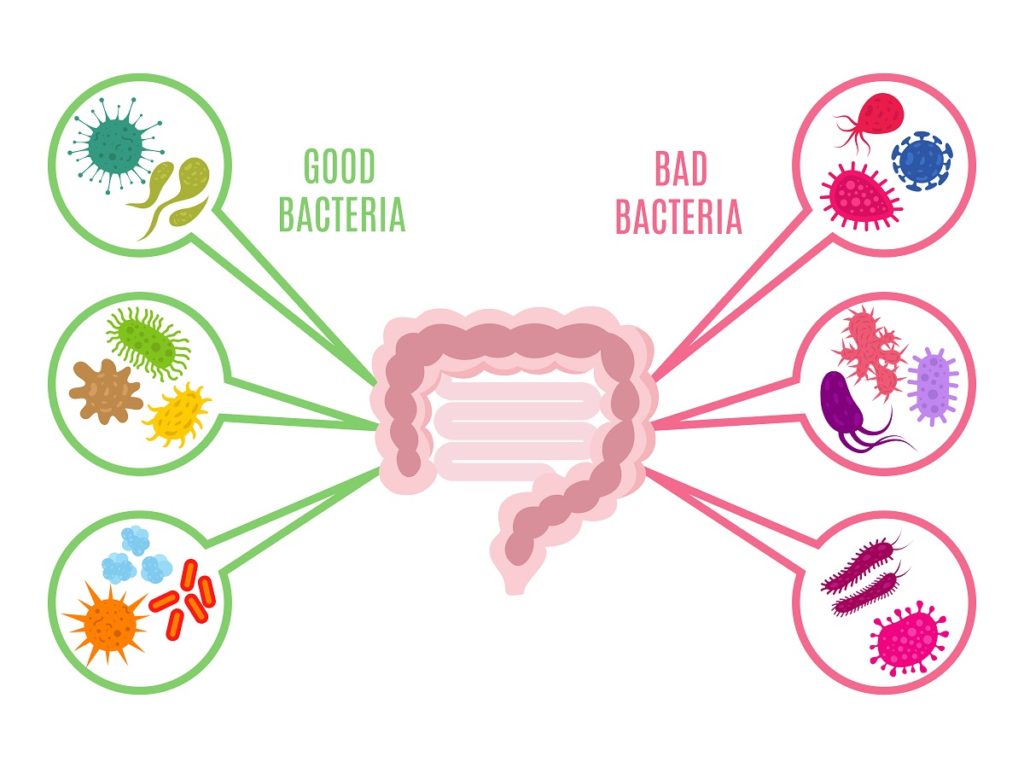
When the intestinal tract is repetitively exposed to toxic substances (such as antibiotics, steroids, and NSAIDs), these harmful bad bacteria, yeast, and other microorganisms begin to proliferate and create an imbalance in the bowel flora.
These toxins can cause a myriad of health problems, such as Candida yeast syndrome, fatigue, depression, allergies, eczema, vitamin B12 deficiency, autoimmune diseases such as rheumatoid arthritis and lupus, CFS, IBS, colitis, and psoriasis.
To correct this overgrowth of Candida yeast and bad bacteria you need to put more good bacteria into your body to tip the scales back over to the “good guys.” You do this by taking probiotics. Lactobacillus (L. acidophilus), Lactobacillus rhamnosus (L. rhamnosus), and Bifidobacterium bifidum are the three most important.
Probiotics Are Good For You, But Who Do You Trust?
A lot of this information about probiotics has now made its way into magazines and newspaper articles. And so you’ve already heard that probiotics are good for your health. You’ve heard that they support a healthy immune system. And you’ve seen advertisements telling you to take them for help with digestive disorders such as bloating, gas, and indigestion.
Unfortunately, most people who are now taking probiotics are wasting their money – and still suffer from bloating, gas, indigestion, and other digestive problems.
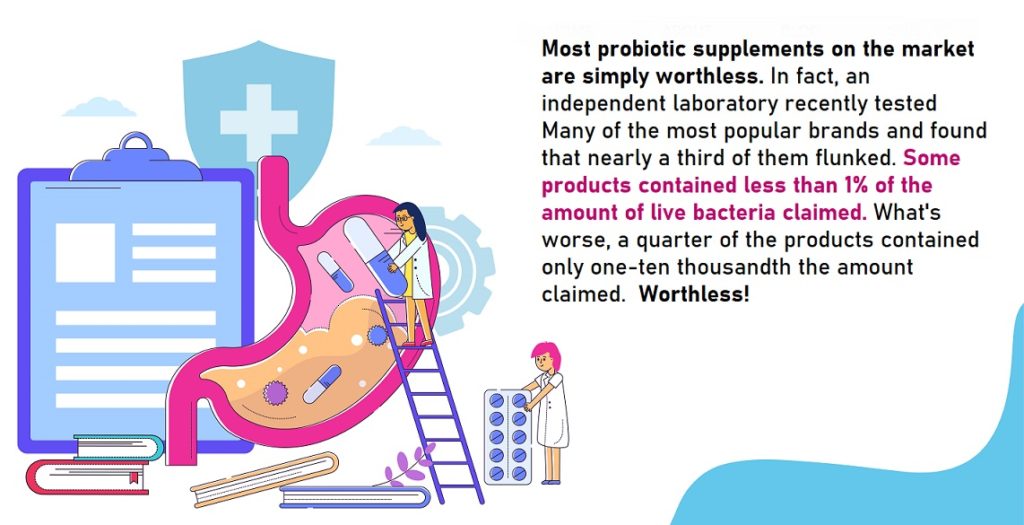
So How Can You Get Your Money’s Worth?
Every probiotic supplement claims to have a high number of organisms. But, and this is a big but, these organisms are counted at the time of manufacture, not at the time they reach your grocer’s shelf. By the time you buy them, they’ve often been exposed to light and heat, which kill off and drastically reduce the number of the beneficial bacteria.
In fact, Consumer Reports tested 27 different probiotic products and found that one in four supplements contained fewer bacteria than the amount claimed at the time of manufacture.
This is why probiotic formulas, once opened, require refrigeration. But even those brands don’t always work as well as they should. That’s because the organisms can be weakened or killed by the acids in your stomach. If they are destroyed in your stomach they never reach your intestinal tract where they are needed to do their job. Worthless!
What About Yogurt?
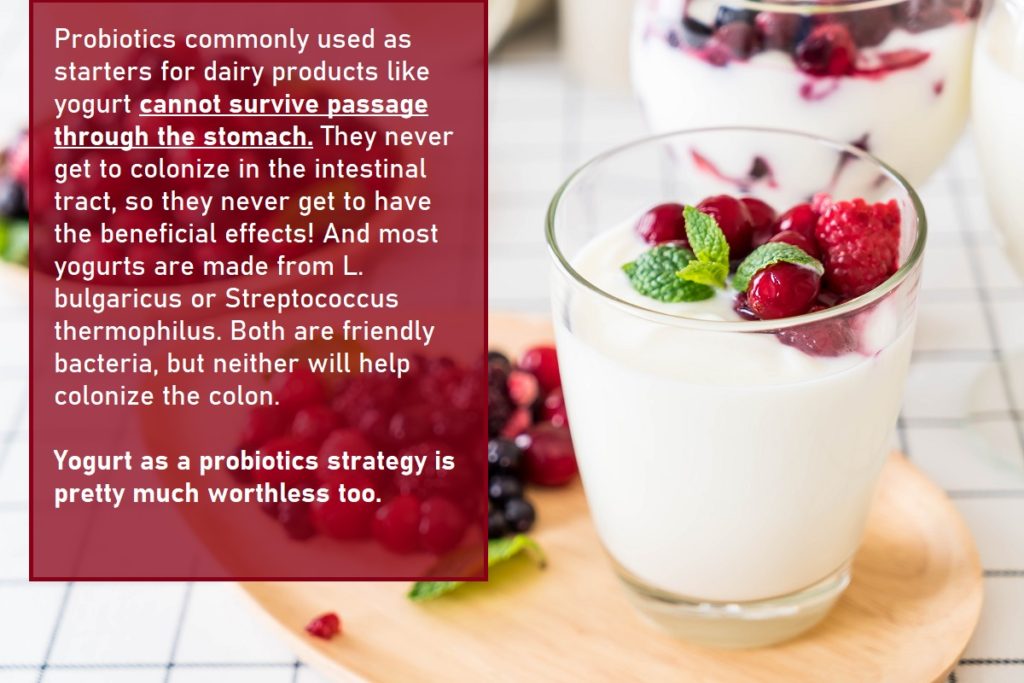
When Should You Take Probiotics?
Anytime you take antibiotics or cortisone (steroids) you kill off the good bacteria- take probiotics for 2 weeks.
Birth control pills can lead to depletion of the good bacteria, so can long-term use of non-steroidal anti-inflammatory drugs (NSAIDs), and changes in diet (traveling). Viral infections, especially stomach “bugs” should be countered with daily probiotics (9 billion a day on an empty stomach).
As a health enriching, disease preventing strategy, immune boosting strategy, I recommend taking probiotics for 2-3 weeks out of every month.
A New Type Of Probiotic
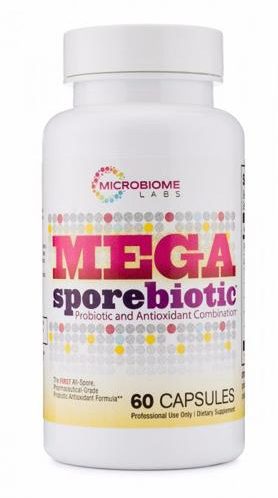 Over the last couple of years I’ve been recommending a new, unique type of probiotic-spore probiotic. There are several advantages to using spore probiotics including their ability to withstand extreme hot or cold temperatures (shipping, traveling) without compromising their effectiveness. They can be taken with or without food and aren’t compromised by antibiotics.
Over the last couple of years I’ve been recommending a new, unique type of probiotic-spore probiotic. There are several advantages to using spore probiotics including their ability to withstand extreme hot or cold temperatures (shipping, traveling) without compromising their effectiveness. They can be taken with or without food and aren’t compromised by antibiotics.
I recommend MegaSpore Biotic which is a probiotic blend of 5 Bacillus spores that have been clinically shown to maintain healthy gut barrier function and overall immunity.MegaSporeBiotic™ is the first 100% spore-based, broad-spectrum probiotic clinically shown to improve leaky gut in just 30 days.
MegaSporeBiotic™ boasts a 5-year shelf-life, does not require refrigeration, and maintains efficacy during antibiotic therapy.** Unlike other probiotics, Bacillus spores are naturally designed to survive digestion.
The bi-phasic life cycle of the Bacillus spores allows them to remain dormant in harsh environments (immune to changes in temperatures, shipping, traveling, etc.) until they reach more favorable environments like the human gastrointestinal tract. Once inside the large intestine, these dormant spores can change into their active, vegetative forms and begin colonizing in the gut.
The reason for their inherent survivability comes from their bi-phasic life cycle. This means that the Bacillus spores can transition interchangeably from their dormant form to their active form, depending on the environment. In its dormant spore form, Bacillus will surround itself with an endospore, which is a tough, natural outer shell that protects it from light, heat, pressure, acid, lack of oxygen, and other environmental factors. This key feature is what allows MegaSporeBiotic™ to survive easily through digestion without the need for enteric-coated capsules or refrigeration. Once it reaches the intestines, MegaSporeBiotic™ can increase microbial diversity by changing the pH, crowding out unwanted pathogens, and increasing the production of short-chain fatty acids.
–> You can learn more about MegaSpore Biotic HERE
We May Get A little Crumpled From Time to Time
A well known speaker started off his seminar by holding up a $20 bill. In the room of 200, he asked, “Who would like this $20 bill?”
Hands started going up.
He said, “I am going to give this $20 to one of you but first, let me do this.” He proceeded to crumple the dollar bill up.
He then asked, “Who still wants it?” Still the hands were up in the air.
“Well,” he replied, “What if I do this?” And he dropped it on the ground and started to grind it into the floor with his shoe.

He picked it up, now all crumpled and dirty. “Now who still wants it?” Still the hands went into the air.
“My friends, you have all learned a very valuable lesson. No matter what I did to the money, you still wanted it because it did not decrease in value. It was still worth $20.
Many times in our lives, we are dropped, crumpled, and ground into the dirt by the decisions we make and the circumstances that come our way.
We feel as though we are worthless. But no matter what has happened or what will happen, you will never lose your value.
You are special – Don’t ever forget it!